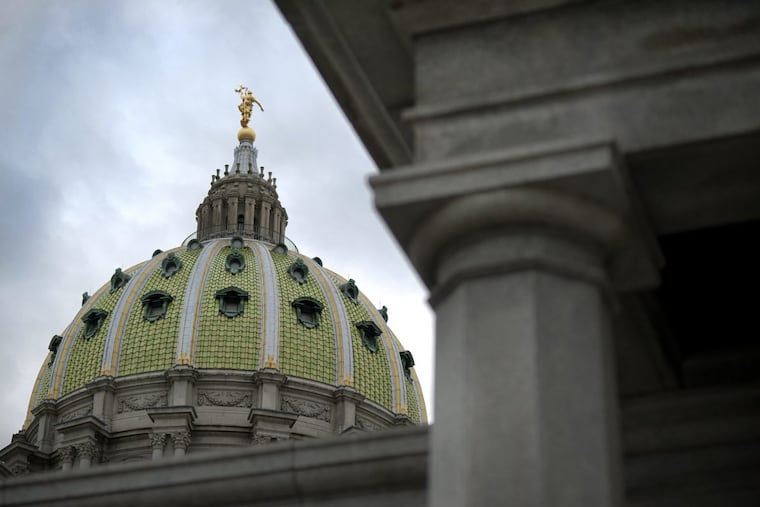Property tax likely here to stay in Pa. Here's why
A constitutional amendment opened the door to property tax reform in Pennsylvania, but no other state has succeeded in eliminating the tax.

The earliest known property tax records were kept on clay tablets.
Now some Pennsylvania lawmakers and grassroots groups — along with a majority of voters who approved a constitutional amendment on Election Day — want to go against about 8,000 years of history and eliminate a tax that today is a primary means of paying for schools and local government.
But if history is any indication, property taxes are here to stay in Pennsylvania.
Pennsylvania's constitutional amendment grew out of the efforts of homeowners who organized groups and attracted attention from lawmakers in Harrisburg.
Keystone State residents are hardly the first to rally against the wildly unpopular real estate levy. Yet it remains a staple in all 50 states.
It is a predictable source of revenue, less susceptible to the caprices of the economy than sales or income taxes. And efforts to move away from it bump into a reality, said Isaac Martin, a sociology professor at the University of California San Diego.
"The reason that no one has gone whole hog to get rid of the tax," he said, "is that we need the things the tax pays for."
The Pennsylvania referendum result has no immediate impact on taxes but it opened the door to property tax elimination, or at least an overhaul of the system. The legislature could pass a law that allows individual governments — school districts, municipalities, and counties — to exempt property owners from paying levies on their primary residences. But such a move would require further legislation to provide replacement revenue, such as increasing those sales and income taxes.
"When people are upset about property taxes, politicians tend to listen more," said Martin, who has studied and written about revolts against the real estate levy. "Because they're taxes on owner-occupied homes, … they hit people who happen to be especially likely voters, and happen to be concentrated in the same electoral districts."
Other states have seen movements to abolish property levies, but they ended up either failing or leading to changes that simply limited their use. North Dakota voters rejected a 2012 ballot measure that would have outlawed them. California lawmakers dealt with the issue with a 1978 law — the so-called Proposition 13 "mad as hell" tax revolt — that restricted increases in property assessments. Since California adopted those limits, several other states have followed with similar mixtures of limitations to protect homeowners.
Sebastien Bradley, an assistant professor of economics at Drexel University, said states have addressed property taxes by limiting tax rates, the amount of revenue that property taxes can raise, or the amount by which assessments can change. But property taxation is likely here to stay, he said.
"Virtually every state relies on property taxes to some degree," he said. "Nobody likes taxes, but as far as taxes go, property taxes are a pretty efficient way to raise revenue."
Michigan confronted the issue in a dramatic manner in the 1990s, when state lawmakers eliminated the school property tax without having any replacement revenue in place.
"We jumped out of the plane without a parachute and knitted it on the way down," said Doug Roberts, who served as the state treasurer at the time under then-Gov. John Engler.
Michigan today still uses the solution that lawmakers found and voters approved — but it does still involve some property taxes.
The state funded schools by raising the sales tax and enacting a smaller, statewide property tax that was distributed to local school districts. But districts that already had been spending more per pupil than the new state allotment were allowed to continue taxing property to make up the difference. In addition, school districts can still levy taxes — with voter approval — for capital improvement projects such as constructing new buildings.
Michigan property owners also still pay taxes to local and county governments. And despite a massive overhaul of the school-funding system, the state ranks 15th out of 50 for its reliance on property taxes, according to a report by the Tax Foundation. Michigan raises 35 percent of its total state and local revenue from property taxes, while Pennsylvania, which ranks 27th, gets nearly 30 percent of its revenue from taxes on property, according to the report.
As for Pennsylvania, Robert Strauss, a professor of economic and public policy at Carnegie Mellon University, said the state has too many other issues — an aging population, potential federal tax changes, and persistent problems agreeing on how to fund the annual state budget — to enact property-tax reform based on the new constitutional amendment.
"The real world of state and local government is filled with a lot of problems and issues," he said. "The initiative, in my judgement, went to the wrong goal line. It was kind of wishful thinking."